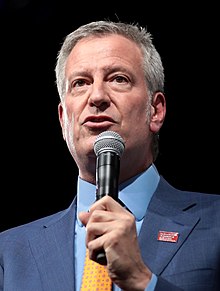Bill de Blasio | |
|---|---|
 De Blasio in 2019 | |
| 109th Mayor of New York City | |
| In office January 1, 2014 – December 31, 2021 | |
| Deputy | Anthony Shorris Dean Fuleihan |
| Preceded by | Michael Bloomberg |
| Succeeded by | Eric Adams |
| 3rd Public Advocate of New York City | |
| In office January 1, 2010 – December 31, 2013 | |
| Preceded by | Betsy Gotbaum |
| Succeeded by | Letitia James |
| Member of the New York City Council from the 39th district | |
| In office January 1, 2002 – December 31, 2009 | |
| Preceded by | Stephen DiBrienza |
| Succeeded by | Brad Lander |
| Personal details | |
| Born | Warren Wilhelm Jr. May 8, 1961 Manhattan, New York, U.S. |
| Political party | Democratic |
| Spouse | |
| Children | 2 |
| Education | New York University (BA) Columbia University (MIA) |
| Signature | |
Bill de Blasio (/dɪˈblɑːzioʊ/; born Warren Wilhelm Jr., May 8, 1961; later Warren de Blasio-Wilhelm) is an American politician who was the 109th mayor of New York City from 2014 to 2021. A member of the Democratic Party, he held the office of New York City Public Advocate from 2010 to 2013.
De Blasio was born in Manhattan and raised primarily in Cambridge, Massachusetts.[1] He graduated from New York University and Columbia University before brief stints working as a campaign manager for Charles Rangel and Hillary Clinton. De Blasio started his career as an elected official on the New York City Council, representing the 39th district in Brooklyn from 2002 to 2009. After one term as public advocate, he was elected mayor of New York City in 2013 and reelected in 2017.
De Blasio's policy initiatives included new de-escalation training for police officers, reduced prosecutions for cannabis possession, implementation of police body cameras, and ending the post-9/11 surveillance program of Muslim residents. In his first term as mayor, he implemented a free universal pre-kindergarten program in the city. De Blasio called attention to what he calls stark economic inequality in New York City, which he described as a "tale of two cities" during his first campaign. He supported socially liberal and progressive policies in regard to the city's economy, urban planning, public education, police relations, and privatization.
De Blasio ran in the Democratic primaries for the 2020 presidential election. After registering low poll numbers and failing to qualify for the third round of primary debates, he suspended his campaign on September 20, 2019, and endorsed Bernie Sanders five months later.
De Blasio was term-limited and ineligible to seek a third term in the 2021 New York City mayoral election. He was succeeded by Eric Adams on January 1, 2022. On May 20, 2022, he announced he was running in the 2022 U.S. House election in the newly redrawn 10th congressional district.[2] He withdrew from the race on July 19, saying he was done with "electoral politics".[3]
- ^ Cite error: The named reference
:1was invoked but never defined (see the help page). - ^ "Ex-NYC Mayor Bill de Blasio announces run for Congress". New York Daily News. May 20, 2022. Retrieved May 20, 2022.
- ^ Fandos, Nicholas (July 19, 2022). "Bill de Blasio Drops Bid for N.Y. House Seat". New York Times. Retrieved July 19, 2022.